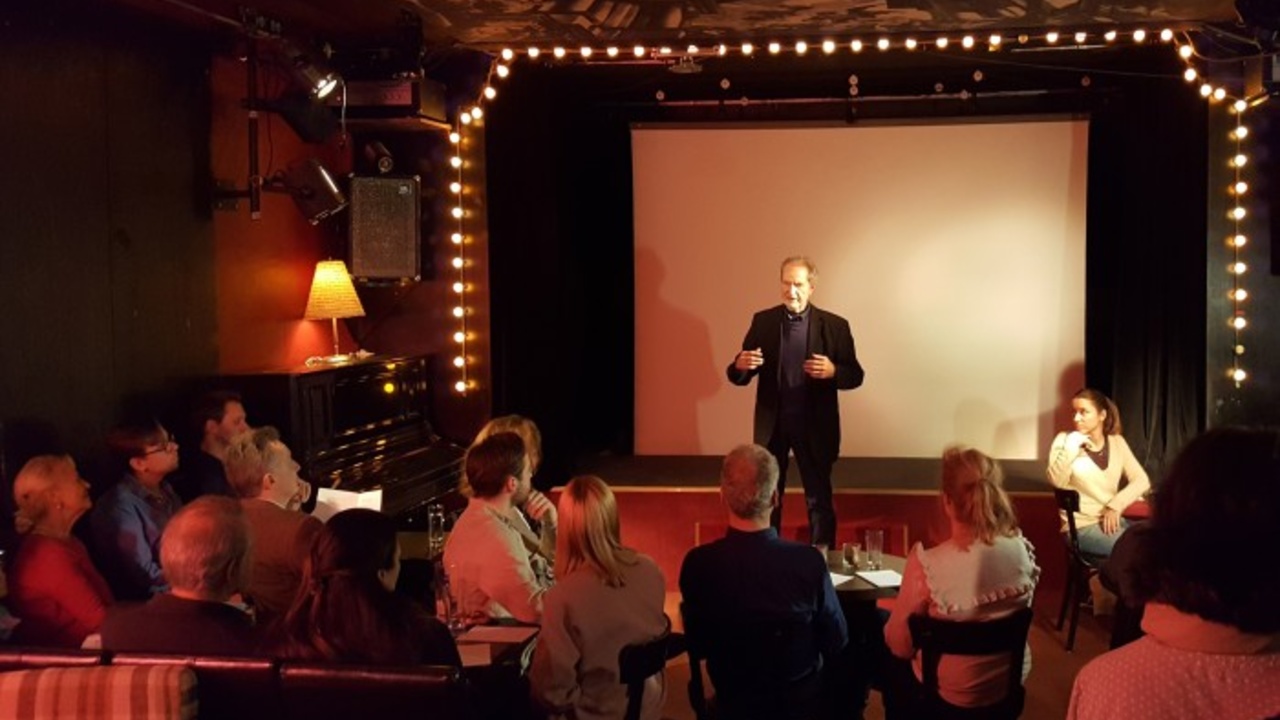(THIS ARTICLE IS MACHINE TRANSLATED by Google from Norwegian)
International Short Film Festival Oberhausen is one of the oldest and most prestigious short film festivals in the world. During the eighth edition of the festival, in 1962, a group of young German filmmakers authored the so-called Oberhausen Manifestowhere they declared the "old" movie - or Papa's cinema - for death. They demanded the creation of a new type of film: more experimental and free from the conventions of the film industry. The manifesto later led to the birth of "the new German film", with representatives such as Alexander Kluge, Edgar Reitz, Rainer Werner Fassbinder, Werner Herzog, Wim Wenders and several other well-known directors.
This year the festival was organized for 64. time. In its present form, the Oberhausen Film Festival is a mecca for experimental art films and visually innovative short films that seek to expand the frame of the cinematic language. In the documentary Beyond Cinema: The Dumpster Kid Experiment and Other Utopias (Robert Fischer, 2018), director Alexander Kluge says that the movie pioneers were curious people experimenting with the film medium. They were "very surprised when they found out that their wonderful invention, their tool of enlightenment, was used to preserve cheap plays". Edgar Reitz also criticizes the standard length of films, claiming that the 90 minutes format was borrowed from the theater and is foreign to the nature of the film.
Commercial industry
Still, it is the commercial film industry that sets the rules. When I say that I work with movies, most people automatically think of whole-night, story-driven fiction films. Everything except this format – documentaries, short films and experimental films – are considered second-rate films, as media and viewers pay less attention. British film theorist Laura Mulvey introduced in the essay Visual Pleasure and Narrative Cinema (1975) the concept of "the male gaze". By that she means that the audience is watching a movie from a heterosexual male perspective. I think you can think the same way about the "look" of the commercial film industry, which has coded its perspective strictly.
Carolee, Barbara and Gunvor can be interpreted as a response to the criticism of "the male gaze".
Fortunately, there are still some prominent actors fighting for this narrow understanding of what film is: the International Short Film Festival is one of them. Interestingly, many documentaries in this year's International Competition focused on the action itself to see.
The woman's eyes
You can interpret Lynne Sachs' short documentary Carolee, Barbara and Gunvor (2018) in response to Laura Mulvey's critique of the male gaze. Sachs follows three women, all renowned avant-garde film directors: Carolee Schneemann, Barbara Hammer and Gunvor Nelson, and gives them space to talk about their passion for film making and their way of seeing the world through the camera lens. Sachs has found a unique film language for each of the stories to reflect the perspectives of their protagonists. Still, there is something missing in these portraits of the three older artists: boldness. Barbara Hammer and Carolee Schneemann are both known for exposing body and sexuality in their work. However, Sachs' film lacks the direct, female gaze that is not afraid to expose the taboos associated with older women's bodies. Sachs is far less daring in her film than her protagonists have been in her own works.
 Critical look
Critical look
With the use of computer-generated aesthetics is Luciano Piazza's experimental documentary acceded (2018) an ode to laziness. The film criticizes modern society's sense of Benjamin Franklin's phrase "time is money". It starts with observations of people in windows and suggests the idea that in a way we all work for the housing industry. Another memorable sequence begins with people photographing flowering cherry trees. In the following scene, we see a computer screen where "cherry blossom cat" is typed into a Google search box. Various kitschy and absurd images of cats in flowering cherry trees emerge. These images illustrate in an excellent way society's obsession with technology. Various philosophers, including Marshall McLuhan, describe technologies as the extension of the human body. acceded invites the viewer to reflect on how technologies define who we are – and ends with apocalyptic predictions.
Personal look
Russian filmmaker Mikhail Zheleznikov's film Kameshki ("Pebble", 2018) is a personal declaration of love for pictures. Since childhood, Zheleznikov has been collecting images of strangers he stumbles across the street and other public places. Mostly there are portraits intended for passports and other documents. In the movie, Zheleznikov gives these characters names and fantasizes about their lives. This playful approach to reality reminds me of how my cousins and I slept in childhood. We chose a stranger in the park and imagined who this person could be. What profession does he have? Does he have family? Where is he going?
Kameshki questions the correlation between reality and image.
In one of the final scenes of the film, two men sit by the sea watching the sunset while filming themselves with a laptop. With a strong Russian accent, one says: "Real life is so boring, even on video." The other replies, "What's the matter with this?" The dialogue questions the correlation between reality and image, and continues the endless discussion of where relevant documentaries are.
In everyday life, we are invaded by thousands of images, and the strongest of them seem to affect how most of us look at the world. I am convinced that film education that presents different perspectives is just as important as literature education that provides insight into different forms of texts. The predictable forms of the dominant film industry are tedious. But of course one needs a certain basis for learning to read more complex and indirect audiovisual texts.


